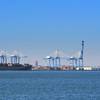Water levels in North America's Great Lakes, the world's largest fresh-water system, are below average for this time of year, and this will affect shipping, recreational boating and marina operators this summer, the Canadian government's environment department said.
Environment Canada said water levels in lakes Huron, Erie, St. Clair and Michigan, which have dropped for the past four years due to warmer temperatures and increased evaporation, are all below average and lower than they were last summer. The average has been calculated annually since 1918.
The ministry said lakes Michigan and Huron are at their lowest levels for this time of the year since 1965, and are currently 2.73 in. below chart datum -- the key reference level used on navigational charts.
Levels of Lake Superior, the world's largest freshwater lake, are expected to be slightly above those of last summer due to good rains, combined with spring snowmelt, but average levels are still 6.24 in. down, the ministry said. The lake is 2 cm above chart datum.
In contrast, the water level of Lake Ontario this summer should be about 10 cm below its average but well above chart datum. "Lake levels are all below average but none are at record lows," Environment Canada spokesman Peter Yee said.
Low water levels on the Great Lakes cause huge economic losses for shipping, recreational boaters and hydroelectric power generation. They also affect wetlands, the fishery and domestic and industrial water supplies.
There are about 33 million people who live in the Great Lakes Basin in Canada and the United States. Some 45 percent of Canada's industrial capacity and 25 percent of its agricultural capacity are located in the basin and contribute C$180 billion ($116 billion) annually to Canada-U.S. trade. - (Reuters)
Featured videos

Inmarsat Enhances Service to Drive Digitalization

Tracking Foreign Vessels Working in the U.S. Jones Act Market

Inside the Electrified Truckable Tug
Subscribe for
Maritime Reporter E-News
Maritime Reporter E-News is the maritime industry's largest circulation and most authoritative ENews Service, delivered to your Email five times per week









